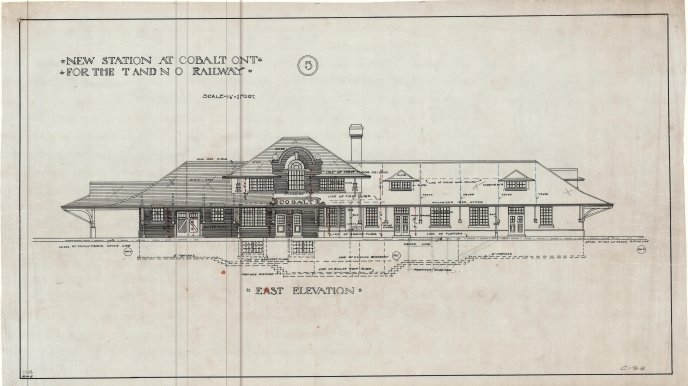Location: Cobalt
Date of Completion: 1910,1992
Architects: John M. Lyle Architect (Original Building)
Taylor/Hazell Architects Ltd. (Restoration)
Nominated by: John Vanthof, MPP (Timiskaming-Cochrane)

Image Credit: Cobalt Mining Museum, Accession #C838-E
Chicken or the Egg
Cobalt’s train station stands as a monument to the town’s foundation. When the Temiskaming and Northern Ontario Railway was being built, there were no plans for a station at that location. However, as railroad workers made their way through the forest, they came across a vein of silver. This place would soon become the town of Cobalt. The silver rush resulted in a haphazard town with buildings erected from temporary materials. The train station, however, was a different story.
Originally a temporary building, it was soon replaced with a small but elegant civic building befitting the growing status of Cobalt. It was designed by renowned architect John Lyle - the same architect at Toronto’s Union Station - and features elegant brick and stone exteriors, dormers to bring natural light, and a sweeping cantilever roof to provide shelter.

Image Credit: Courtesy of Winnie Kammermayer
Adaptive Reuse
After serving for many decades as the gateway to Cobalt, it fell into disuse when trains were replaced with bus service. For years it sat empty, until it was adapted to serve as a museum and cultural centre, all while restoring its heritage features. Now it is undergoing a new round of renovations as it gets ready to become a new event space for the city, making sure this building continues to serve the community.

Drawing Courtesy of Winnie Kammermayer
The Role of the Modern Architect
Contemporary architects have played a crucial role in ensuring Cobalt Station remains a critical part of Cobalt’s community – even after its closing as a train station. In 1992 Taylor Hazell architects were retained by the Ontario Ministry Culture to prepare drawings and review services for the conservation, restoration, and retrofit of the historic Cobalt Station. This project followed a community movement that recognized the importance of retaining character defining buildings in the face of an uncertain future. The detailed drawings and specifications combined with regular site visits ensured that local enthusiasm to do the work was aligned with Provincial and Parks Canada standards for conservation, restoration and adaptive reuse. The work included interior modifications to create clear interior space; wood, roof and masonry conservation; door and window conservation and restoration; as well as historic paint analysis and colour selection.
This post forms part of our World Architecture Day Queen’s Park Picks 2017 series in which we asked Ontario’s Members of Provincial Parliament to nominate a prominent building, past or present, in their riding for a chance to learn more about it. Check out the rest of the series to learn more about Ontario’s great
architecture.